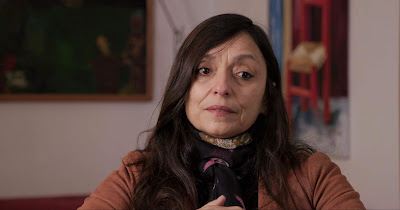Cordillera -- a Spanish word appropriated into English -- signifies an extensive chain of mountain/mountain ranges. In Patricio Guzmán's new film, THE CORDILLERA OF DREAMS, the word applies to one of several South American Andes ranges, specifically the Chilean Coast Range.
Documentary film fans will have no trouble linking Señor Guzmán (shown at right) to Chile: For some fifty years this filmmaker has been making documentaries about his homeland and the 1973 military coup (helped along in no small part by the USA) that removed the democratically elected President of Chile, Salvador Allende, from office and installed in his place a dictator by the name of Augusto Pinochet.
From The Battle of Chile, detailing the fight against the right-wing coup, through later docs such as Nostalgia for the Light and The Pearl Button, offering poetic, historical and hugely troubling looks at the murderous work of the "Pinochettes" (perhaps the Pino-shits?), Guzmán has continued to mine history, memory and cinema, looking for ways to come to terms with his own history and the home and country to which, post Pinochet's coup, he has never returned.
In several of his most recent movies, the filmmaker has turned to landmarks that double as symbols -- such as the sea that entirely borders one side of his homeland, the moon (via that titular pearl button), and the Atacama Desert (which houses both the bones of those murdered by Pinochet and the famous observatory that is able to look so precisely at the stars). Via a combination of poetry -- visual and verbal: Guzmán writes and narrates his own movies -- history and memory, the filmmaker weaves documentaries unlike most others.
In The Cordillera of Dreams, the symbol is the Andes mountain range itself and (wisely, TrustMovies believes), perhaps in obeisance to that grand and gorgeous cordillera, Guzmán's subject here moves from the utter horrors of torture and death to a look at Chile today, socially, economically, politically. And while the picture the filmmaker and his interviewees offer up is certainly not a pretty one -- as glass veneered and "contemporary" as the country's more glamorous cities have now evolved -- we are spared the tales of murder and the constant struggle of parents to discover what happened to their "disappeared" offspring.
Still, what the people he interviews here have to tell us may seem to many Americans a kind of warning of what is to come, should we return the corrupt and ever-more dictatorial Trump administration to office in 2020. When one woman talks about what she felt as a child, witnessing her parents' sudden confusion and fear during the right-wing coup, we can only shudder in anticipation. And perhaps in shame and disgust at America's participation in that infamous coup.
So Guzmán, although he shows us "the ruins of my childhood," remains an ex-patriot (he lives in France), as does his artist friend whom we see and hear early in the film and who now lives in Spain. Both men reflect on how, while the cordillera protects Chile, it also isolates it. And so we view and listen to this lovely, sad combination of poetry, history, memory, politics and economics. The movie closes with a mention of what Guzmán calls his country's ghost trains. They movie at night and on no actual schedule because, "in Chile, what can't be seen, does not exist."
From Icarus Films, running 85 minutes and in Spanish with English subtitles, The Cordillera of Dreams opens theatrically this Wednesday, February 12 at the IFC Center in New York City, and on February 21 at the Lumiere Music Hall in Los Angeles and the Gene Siskel Film Center in Chicago, followed by cities across the U.S. and Canada.
Special Note:
Five of Patricio Guzmán's other documentaries including
THE BATTLE OF CHILE (1975), THE PINOCHET CASE (2001),
SALVADOR ALLENDE (2004), NOSTALGIA FOR THE LIGHT (2011),
and THE PEARL BUTTON (2014) are available
on the OVID subscription streaming service.












No comments:
Post a Comment